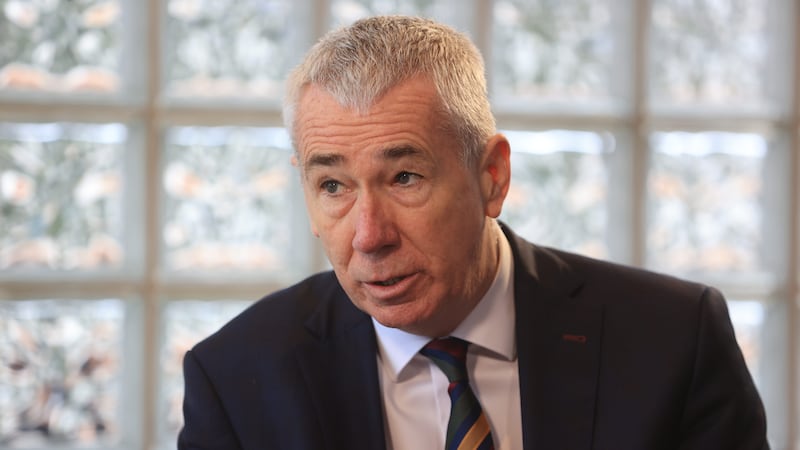We have just passed the 50th anniversary of Pope Paul VI’s encyclical, Humanae Vitae. He rejected the views of a papal commission and reiterated a ban on contraception. The Pope said its use was ‘evil’. He was as “unequivocal” then on Contraception as is Fr Patrick McCafferty today on abortion (July 31).
The Church largely ignores the many Catholics who ignore the contraception ban. It appears so too does Fr McCafferty. There is no evidence that parishioners supporting contraceptive use face Fr McCafferty’s ban on marrying in his church, suffered by supporters of a woman’s right to choose.
Fr McCafferty’s a la carte approach fixates on abortion because he is trying to ensure that women in the north of Ireland are denied rights enjoyed elsewhere on these islands.
Fr McCafferty also ignores (for the third time) the issue of free speech for staff and students at St Mary’s University College. Can they support abortion rights, in his view, without threat of sanction?
Instead of debating these matters, Fr McCafferty issues edicts. His views are absolute, on paper.
On one subject, an opinion is voiced. Fr McCafferty is uncomfortable that usually antagonistic followers of the infallible book and of the infallible Pope are united against abortion. Merely ‘coincidental’ says Fr McCafferty, in a less than ecumenical aside on his agreement with Protestant fundamentalists.
Fr McCafferty cries ‘no compromise’, or should that be ‘no surrender’, in consideration of ‘defenceless’ women who, before the southern abortion referendum, were forced to give birth if they could not escape to England.
In a prequel to the recent referendum the equally sensible electorate voted in 1992 to retain the suicide exception, to a right to information on abortion and to a right to travel to get one. A succession of further examples forced the government, eventually, to set in train a process to rid us of the barbaric abortion ban.
Many people may take their religion from Rome but, increasingly, politics is from home.
Dr NIALL MEEHAN
Griffith College, Dublin
Obvious and workable solution for Irish unity
After Peter Robinson’s recent MacGill Summer School remarks regarding Irish unity, it may be prudent for six county nationalists to formally consider what shape any new such political entity might take.
One million unionists would be a sizeable minority in a united Ireland. Their fears and collective identity would need to be addressed if they are to be persuaded to enter such an arrangement peacefully.
The most obvious and workable solution would be for the province of Ulster, including Co Louth, to become semi-autonomous within that Irish Republic. Such a measure would create the breathing space necessary for the people here to appreciate one another anew, forging a shared Ulster identity.
The passport and subsequent citizenship provisions that exists today in the six counties, could be continued. The entire compromise, that is a semi-autonomous Ulster, could be guaranteed for at least two generations to allay any unionist concerns about southern dominance, with decisions after that time being made by future generations who do not carry the burden of grief and bitterness that those today suffer under.
In this way, Ulster would have de facto independence although wholly within the constitutional confines of an Irish Republic. This plan for Ulster would appear to be the only apparent practical solution that will give republicans their republic, while reducing the overwhelming worry that unionism suffers from at the thought of becoming chattel for a Dublin government still in thrall to the Catholic Church.
In any event, Robinson’s words serve to highlight the growing realisation among unionists that the demographic trends are not in their favour. When the majority in the six decide that the union must end, then the union will end. Unionists will have no alternative but to comply regardless of any current petty remonstrations to the contrary.
The more prudent among them will understand that this plan for Ulster is the insurance policy that Peter Robinson was referring to.
ANTÁN O DÁLA AN RÍ
Newry, Co Down
Search for oral history participants
My name is Lorraine Grimes a PhD researcher at the National University of Ireland, Galway and I am looking for participants for a project entitled: ‘Migration and Assistance: Irish Single Mothers in Britain from 1926-1980’. This project will investigate the migration of unmarried Irish mothers to Britain and the assistance availed of in Britain. The purpose of the oral history interviews is to establish why women felt the need to emigrate and to note their experiences in Britain. Women’s stories will be central to the narrative.
All participants must fit the following criteria to participate in the in project: Irish woman (Republic or Northern Ireland); single mother who migrated to the UK (on a short-term or long-term basis) between the years 1926-1980. Participants can be based in Ireland or Britain and have travelled anytime from 1926-1980. Confidentiality will be guaranteed. Interested participants please contact me on:
l.grimes2@nuigalway.ie
LORRAINE GRIMES
National University of Ireland, Galway
SF and Tories unite over abortion
I was surprised but not shocked to read recently that Sinn Féin leaders Mary Lou McDonald and Michelle O’Neill had joined with Tory MPs and peers and other politicians in signing a joint letter to the Sunday Times demanding changes to abortion legislation in the north. They wrote: “This is the first and critical step to ending the treatment of British and Irish women living in Northern Ireland as second-class citizens”.
So not only does the leadership of Sinn Féin in alliance with the Tories and others want to make abortion more available here but they also now recognise the legitimacy of ‘Northern Ireland’. And these people have the audacity to call themselves republicans.
S FOX
Glengormley, Co Antrim
Definite DUP pre-condition
Arlene Foster has criticised Sinn Féin on a number of occasions for having ‘red lines’ in regard to future political talks – particularly on an Irish language act. This red line would imply that Sinn Féin would only go back to Stormont once this issue had been agreed in negotiations.
In an opinion piece Mrs Foster wrote: “The DUP has no red lines nor pre-conditions” for future talks.
Last week, Mrs Foster told the BBC that a standalone Irish language act was not negotiable. This would imply that the issue of an Irish language act could not even be discussed at future talks. This seems to me to be a very definite DUP pre-condition.
TOMÁS MAOILSEACHLAINN
Lettermacaward, Co Donegal
Missed opportunity
It is a missed opportunity that Pope Francis is not coming to Northern Ireland. It would have been better if he had given Knock a miss and come north on this occasion. His visit would have given a much needed boost to the people here.
AILBHE O'LONNARGAIN
Loch Gile, Árd Mhacha







